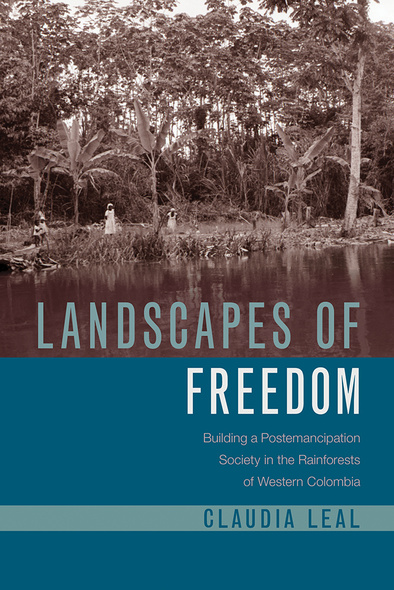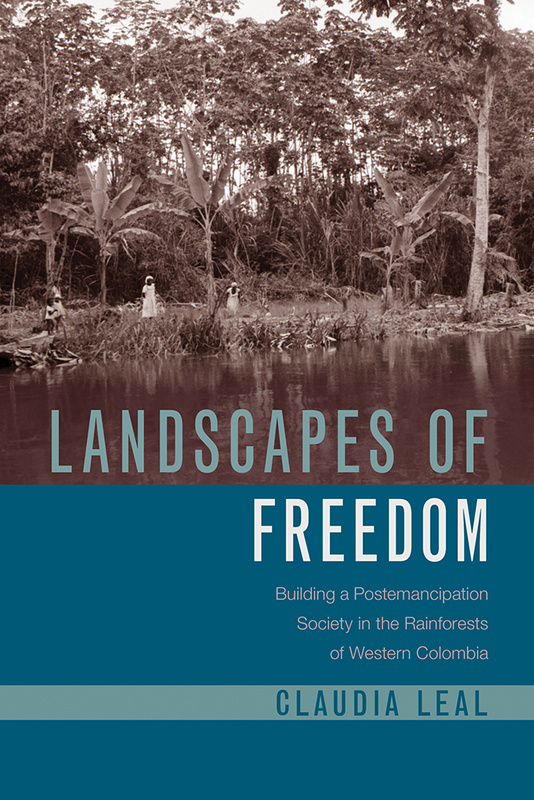
Landscapes of Freedom
Building a Postemancipation Society in the Rainforests of Western Colombia
After emancipation in 1851, the African descendants living in the extra-humid rainforests of the Pacific coast of Colombia attained levels of autonomy hardly equaled anywhere else in the Americas. This autonomy rested on their access to a diverse environment—including small strips of fertile soils, mines, forests, rivers, and wetlands—that contributed to their subsistence and allowed them to procure gold, platinum, rubber, and vegetable ivory for export.
Afro-Colombian slave labor had produced the largest share of gold in the colony of New Granada. After the abolishment of slavery, some free people left the mining areas and settled elsewhere along the coast, making this the largest area of Latin America in which black people predominate into the present day. However, this economy and society, which lived off the extraction of natural resources, was presided over by a very small white commercial elite living in the region’s ports, where they sought to create an urban environment that would shelter them from the jungle.
Landscapes of Freedom reconstructs a nonplantation postemancipation trajectory that sheds light on how environmental conditions and management influenced the experience of freedom. It also points at the problematic associations between autonomy and marginality that have shaped the history of Afro-America. By focusing on racialized landscapes, Leal offers a nuanced and important approach to understanding the history of Latin America.
The book is an important contribution to the emerging body of historical literature on Afro-Colombia, the environmental history of the Pacific, and the perennial question of how to study tropical resource extraction.’—Choice
‘Landscapes of Freedom offers a significant alternative historical trajectory by demonstrating how Afro-Colombians’ experience of freedom has been mediated by a particular rainforest environment. This book should be read not only by Latin American environmental historians but also by any scholar interested in the dynamic political economies and ecologies of natural resource extraction.’—Environmental History‘Claudia Leal successfully presents an enjoyable account of overlooked as-pects in the scholarship such as the constant defense of autonomy in the Pacific lowland rainforest. The book's success is its turn away from the exploitative emphasis the extractive economies to uncover the lowland rainforest landscape as a historical setting in which oppressed people exercised agency.’—European Review of Latin American and Caribbean Studies
‘This may be the most significant scholarly work on Colombia’s Pacific lowlands in the last fifty years. Its content is totally new and original. Leal straddles environmental history, social history, economic history, and geography, showing a mastery of each.’—Kris Lane, author of The Colour of Paradise: The Emerald in the Age of Gunpowder Empires
‘This book examines a unique region of Latin America, the Pacific coast rainforests of Colombia, that we have long needed to know more about. Connecting Afro-Latin American history to environmental history, it makes major contributions to both fields. And it forcibly reminds us of the immense importance of tropical rainforests—both their presence and their absence—in our collective past and present.’—George Reid Andrews, author of Afro-Latin America: Black Lives, 1600–2000
Acknowledgments
Voyages into the Rainforest: An Introduction in Three Acts
PART I: AN EXTRACTIVE ECONOMY
1. Slave Mining and Emancipation
2. Freedom and the Persistence of Extraction
3. Traders in Natural Commodities
4. The Politics of Natural Resource Access
PART II: RACIALIZED LANDSCAPES
5. Blackness, Forests, and Nation
6. Urban Dreams and Nightmares
Conclusion: A People and an Environment with History
Notes
Bibliography
Index




